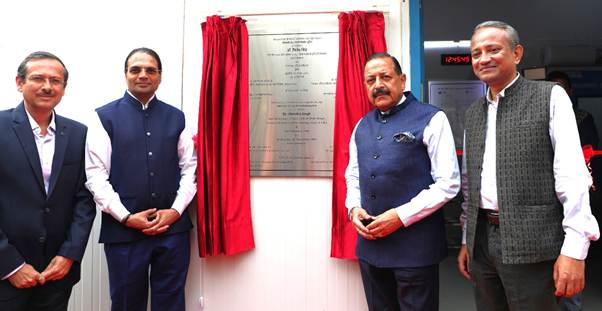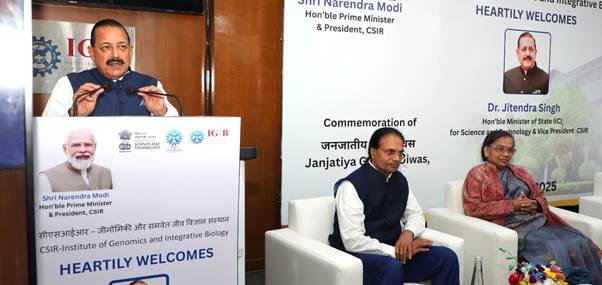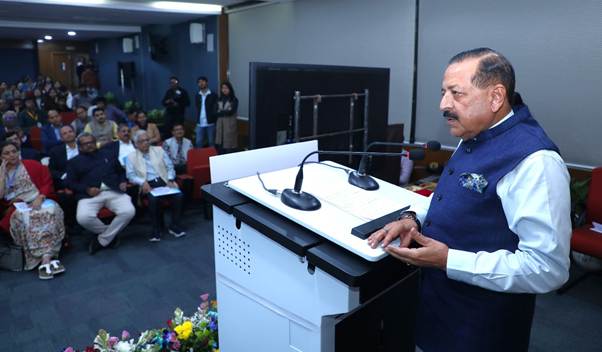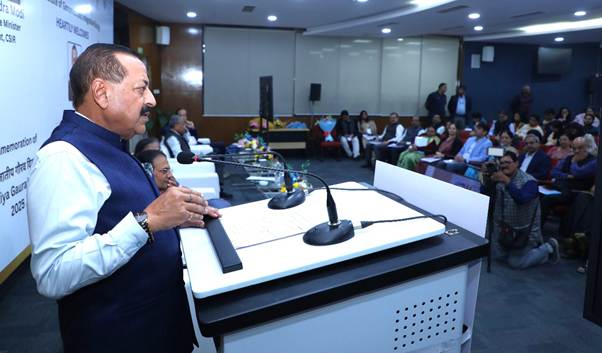Ministry of Science & Technology
Union Minister Dr. Jitendra Singh launches India's first indigenous "CRISPR" based gene therapy for Sickle Cell Disease, which particularly affects India's tribal population
The therapy, named "BIRSA 101", is dedicated to Bhagwan Birsa Munda, whose 150th anniversary was observed few days back and who is remembered as a great tribal freedom fighter
India Begins Decisive Journey Toward a Sickle Cell–Free Nation as Dr. Jitendra Singh Unveils Indigenous breakthrough
CSIR-IGIB and Serum Institute Sign Technology Transfer Agreement for Affordable Gene Therapies
Public–Private Partnership Strengthens as Serum Institute Commits to Accessible Gene Therapy for All
India Sets New Milestone in Atmanirbhar Bharat with World-Class, Low-Cost Gene Editing Solutions
Posted On:
19 NOV 2025 5:36PM by PIB Delhi
Union Minister of State (Independent Charge) for Science & Technology; Earth Sciences; MoS PMO, Personnel, Public Grievances, Pensions, Atomic Energy and Space, Dr. Jitendra Singh today launched India's first indigenous "CRISPR" based gene therapy for Sickle Cell Disease, which particularly affects India's tribal population. The therapy, named "BIRSA 101" is dedicated to Bhagwan Birsa Munda, whose 150th anniversary was observed few days back and who is remembered as a great tribal freedom fighter.
While announcing this, the Minister said that India has formally begun its decisive journey towards becoming a Sickle Cell Disease–free nation, marking a historic turning point in the country’s public health and genomic medicine landscape.
The Minister said that with the development and transfer of India’s first indigenous CRISPR-based gene therapy, the nation has taken a major step toward fulfilling the Prime Minister Sh. Narendra Modi’s vision of a Sickle Cell–Free India by 2047, while simultaneously advancing the goal of Atmanirbhar Bharat in frontline medical technologies.
Dr. Jitendra Singh emphasised that the breakthrough, developed at CSIR–Institute of Genomics & Integrative Biology (IGIB), has demonstrated India’s capability to produce pathbreaking therapies at a fraction of global costs, potentially replacing treatments priced at ₹20–25 crore overseas. He underlined that this innovation carries deep national significance, especially for tribal communities in central and eastern India, where the disease burden is highest.
The event was attended by senior leadership from India’s scientific ecosystem, including Dr. N. Kalaiselvi, Director General, CSIR; Dr. Souvik Maiti, Director, CSIR-IGIB; Dr. Umesh Shaligram, Executive Director, Serum Institute of India (SIIPL); and faculty, researchers, and scientists from IGIB, along with invited guests and members of the media.
Addressing the gathering, Dr. Jitendra Singh said that the indigenous CRISPR platform, named BIRSA 101 in honour of Bhagwan Birsa Munda- marks a scientific milestone that positions India among global leaders in advanced therapeutics. Explaining the gene-editing approach in simple terms, he said the technology works like a “precise genetic surgery”, capable not only of curing Sickle Cell Disease but also transforming treatment pathways for several hereditary disorders.
He urged scientific institutions to communicate breakthroughs in simple language through infographics and social media, ensuring the public fully understands the significance of these advancements.
Dr. Jitendra Singh praised the growing synergy between government scientific institutions and Indian industry, especially the Serum Institute of India. He said such partnerships have already delivered globally recognised achievements- including COVID-19, HPV and other critical vaccines, and will now accelerate India’s leadership in gene therapy.
He emphasised that the Government alone cannot shoulder the entire burden of biotechnology expansion, and industry participation is essential for scale, affordability, and global competitiveness.
During the visit, Dr. Jitendra Singh inaugurated a new advanced research and translational facility at CSIR-IGIB. He interacted with scientists, reviewed work across genomic medicine programmes, and highlighted the need for integrated national models such as One Week- One Theme, enabling collaborative research across CSIR, DBT, and partner institutes.
A formal technology transfer and collaboration agreement was exchanged between CSIR-IGIB and the Serum Institute of India Pvt. Ltd., enabling translation of IGIB’s engineered enFnCas9 CRISPR platform into scalable, affordable therapies for Sickle Cell Disease and other critical genetic disorders. Dr. Singh said this partnership mirrors India’s successful public-private model seen during the development of several vaccines and therapeutics over the past decade. He highlighted that the collaboration ensures that breakthroughs achieved in laboratories do not remain confined to research papers but reach real-world clinical deployment at scale.
The Minister said that the transfer of BIRSA 101 and the CRISPR platform to a world-leading manufacturer like Serum Institute guarantees affordability, scalability, and global-standard manufacturing pathways- ensuring that advanced gene-editing cures become accessible for Indian patients, especially among underserved tribal populations.
Dr. Jitendra Singh concluded that the breakthroughs witnessed today reaffirm India’s scientific capabilities, as seen in the rapid development of vaccines, antibiotics, and now gene therapies. He urged scientific institutions, private partners, and policy agencies to work in a unified “One Week–One Theme” approach to accelerate outcomes and ensure constant visibility of India’s scientific progress.
The Minister said India’s journey—from being dependent on imported biomedical technologies to becoming a global leader in drug development, vaccines, and now CRISPR therapeutics—is a testament to the visionary leadership of the Hon’ble Prime Minister and the growing confidence of Indian science on the world stage.
“We are no longer just adopting global technologies; we are creating them. The world will now look to India for the future of affordable, cutting-edge healthcare,” the Minister said.
Speaking on the occasion, Dr. Umesh Shaligram, Executive Director, Serum Institute of India, expressed heartfelt gratitude and reaffirmed the organisation’s commitment to translating IGIB’s innovation into real-world impact. He said:
“Globally, gene therapies cost over three million dollars and are beyond the reach of even the wealthy. Our mission is to take Indian innovation and make it accessible for the poorest of the poor. Serum has saved over 30 million lives through affordable vaccines, and we are fully committed to supporting the Prime Minister’s vision of a Sickle Cell–Free India by 2047. With the energy and encouragement from the Minister, we will dedicate all efforts to translate this technology into saving lives.”
He added that Serum Institute would continue working closely with IGIB and CSIR to ensure that innovative therapies reach those who need them most.




*****
NKR/AK
(Release ID: 2191740)
Visitor Counter : 6219